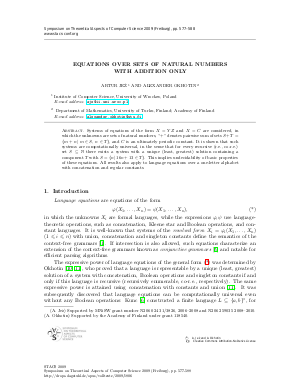Equations over Sets of Natural Numbers with Addition Only
Authors Artur Jez, Alexander Okhotin
-
Part of:
Volume:
26th International Symposium on Theoretical Aspects of Computer Science (STACS 2009)
Part of: Series: Leibniz International Proceedings in Informatics (LIPIcs)
Part of: Conference: Symposium on Theoretical Aspects of Computer Science (STACS) - License:
 Creative Commons Attribution-NoDerivs 3.0 Unported license
Creative Commons Attribution-NoDerivs 3.0 Unported license
- Publication Date: 2009-02-19
File

PDF
LIPIcs.STACS.2009.1806.pdf
- Filesize: 193 kB
- 12 pages
Document Identifiers
Metrics
- Access Statistics
-
Total Accesses (updated on a weekly basis)
0PDF Downloads0Metadata Views
Abstract
Systems of equations of the form $X=YZ$ and $X=C$ are considered, in which the unknowns are sets of natural numbers, ``$+$'' denotes pairwise sum of sets $S+T=\ensuremath{ \{ m+n \: | \: m \in S, \; n \in T \} }$, and $C$ is an ultimately periodic constant. It is shown that such systems are computationally universal, in the sense that for every recursive (r.e., co-r.e.) set $S \subseteq \mathbb{N}$ there exists a system with a unique (least, greatest) solution containing a component $T$ with $S=\ensuremath{ \{ n \: | \: 16n+13 \in T \} }$. This implies undecidability of basic properties of these equations. All results also apply to language equations over a one-letter alphabet with concatenation and regular constants.
Cite As Get BibTex
Artur Jez and Alexander Okhotin. Equations over Sets of Natural Numbers with Addition Only. In 26th International Symposium on Theoretical Aspects of Computer Science. Leibniz International Proceedings in Informatics (LIPIcs), Volume 3, pp. 577-588, Schloss Dagstuhl – Leibniz-Zentrum für Informatik (2009)
https://doi.org/10.4230/LIPIcs.STACS.2009.1806
BibTex
@InProceedings{jez_et_al:LIPIcs.STACS.2009.1806,
author = {Jez, Artur and Okhotin, Alexander},
title = {{Equations over Sets of Natural Numbers with Addition Only}},
booktitle = {26th International Symposium on Theoretical Aspects of Computer Science},
pages = {577--588},
series = {Leibniz International Proceedings in Informatics (LIPIcs)},
ISBN = {978-3-939897-09-5},
ISSN = {1868-8969},
year = {2009},
volume = {3},
editor = {Albers, Susanne and Marion, Jean-Yves},
publisher = {Schloss Dagstuhl -- Leibniz-Zentrum f{\"u}r Informatik},
address = {Dagstuhl, Germany},
URL = {https://drops.dagstuhl.de/entities/document/10.4230/LIPIcs.STACS.2009.1806},
URN = {urn:nbn:de:0030-drops-18061},
doi = {10.4230/LIPIcs.STACS.2009.1806},
annote = {Keywords: }
}
